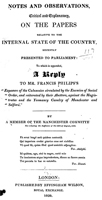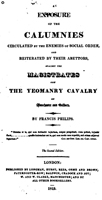
The Peterloo Massacre - Manchester 16th August 1819
TRANSCRIPTION OF : 'NOTES & OBSERVATIONS, Critical & Explanatory, on the Papers Relative to Page 200-206 A REPLY, The peculiar circumstances which have brought the people and the local authorities so much into hostile contact here, are matters of difficult inquiry. I cannot pretend to do more than glance at what appear to me to have been the most operative amongst them. The existence of any political knowledge, or fixed political principles, amongst the poor in this neighbourhood, is of very recent date; and the lessons they have learnt are derived from the sufferings they have endured. When they were wondering that their situation did not improve with the return of peace, and anxious to discover the cause of their disappointment, Mr. Cobbett's masterly essays, upon the financial situation of the country, and the effects of taxation, in reducing the comforts of the labourer, first came before them. The cheapness of these publications ensured them a most extensive circulation; and the strong, clear, condensed, and argumentative style of the writer, was happily adapted to suit the capacity of the most numerous class of his readers. The influence of the more general diffusion of education, too, must not be overlooked. For the last twenty-five years, the proportion of those amongst the labouring classes, who have received the advantage of a good common course of English instruction, at the Sunday Schools, has been daily increasing. They have been continually amalgamating with that order of society to which they belong, and in the character of it they have now produced a general and radical change. The poor, when suffering and dissatisfied, no longer make a riot, but hold a meeting - instead of attacking their neighbours, they arraign the ministry; and, instead of asking for a minimum of wages, they demand a parliament in which their own legitimate influence shall be strong enough to fix the maximum of taxation. But, with this advancement of the poor, in the scale of political knowledge, a similar advancement on the part of the middle class has not been simultaneous. The latter, before the peace, had a long course of comparative, or at least average, prosperity; they were busily occupied with their own private affairs; they read the details of foreign news in the columns of the public journals, but they did not interest themselves about the internal policy of their own country, or if they meddled at all, saved themselves the trouble of inquiring, by a general determination to "support the government," meaning thereby the ministry of the day. In political information, they, therefore, have been comparatively stationary ; and when the steady onward progress of opinion has brought the poor to their heels, instead of attempting to preserve their own superiority, by taking a movement in advance, they turn round upon, and endeavour to repulse, those who have encroached upon the situation which they have been accustomed to fill; they deprive themselves of a fair advantage, lest a similar one should be taken by a class of whom they are jealous or afraid.
But the last two years have produced a considerable change - a change which is still going on, in the sentiments of the middle classes. They begin to find, that they must interfere with domestic politics, because politics will interfere with them; and where they have in any considerable proportion thrown their weight into the same scale with the labouring classes, a more conciliatory mode of conduct must be adopted, than that which has recently been in fashion. Happy indeed would it have been, if a conciliatory spirit had uniformly been displayed. That great part of the disturbances of 1812, and that all the restrictive measures of 1817, might thus have been avoided, I am perfectly satisfied; whilst I am equally convinced, that but for the attack on the meeting of the 16th of August, those detestable Bills, which have now received the sanction of the legislature, would have been destitute of all pretence It is not a little remarkable, that before the second edition of Mr. Philips's pamphlet was published, I had fixed upon the very same occurrences, in proof of the advantage of lenient proceedings which he there adduces as demonstrative of their ill effects. Upon the facts of the case we are agreed. The spinners turned out for an advance of wages, and for a considerable time they marched "in military array," almost daily, through the town. So long as they confined their conduct within the limits of the law, they were not, and they rightly were not, interfered with. But, subsequently, their proceedings became utterly illegal. Not content with refraining from work themselves, they lay in wait for, and abused, those who wished to continue employed - satisfied with the wages they were receiving; and when the masters of any factory, for the protection of the workmen who continued at their labour, fitted up beds, &c. to accommodate them within the mill, an attack was made upon the building itself. Those to whom the care of the property was entrusted, found it necessary to fire upon the assailants. One man was killed, and, I believe, two or three wounded. Here was a palpable and obvious riot, a manifest violation of the law; every person engaged in the attack must have known he was acting illegally, and must have foreseen the probable result of his conduct. There was no speculation about "appearances" and "tendencies;" the breach of the peace on the part of the mob was absolute and undeniable. The consequence was, as might have been expected; public opinion sanctioned the proceedings it was thought necessary to adopt; and when the Boroughreeve and Constables of that year quitted office, they received the unanimous thanks of their fellow townsmen, for their conduct during the turn-out of the spinners. Had the people on the 16th of August committed any act of riot, the measure of dispersing them according to the form of law, would have excited no disapprobation ; but when they had done nothing obnoxious to the known laws on one hand, nor were the provisions of the law, which would have operated in their favour, observed on the other, it is not to be wondered, that the public mind should be revolted, by the treatment to which they were subjected. The strength of all persons in authority consists, either in the employment of absolute force, or in the adoption of such moderate and discreet conduct, as may secure the influence of public opinion in their favour. That the former cannot be employed so as wholly to put down the latter, is, under the present circumstances of the country, sufficiently evident. It is, therefore, most highly desirable, that all persons in official situations should so restrain the force of private opinion and prejudice, should use their important powers with such unimpassioned temperance, as may enable them fully to rely on, and confidently to claim, the approbation of the thinking, the moderate, the intelligent, and the judicious, portion of the community. That the Magistrates, who acted on the 16th of August, have not obtained the approbation of persons of this description, must be admitted by all; nor can l conceive that any circumstances will be developed, either on the trial of Mr. Hunt, or upon any other occasion,which, as it respects them, shall convert "censures into praise, and detestation into gratitude;"' or which, indeed, shall operate any change in the matured and deliberate judgment of the public at large. In commenting upon the Parliamentary Papers, and in answering Mr. Philips's pamphlet, I have only discharged what seemed to me a duty, to the great body of my industrious neighbours and fellow·countrymen - The people are unjustly appreciated; principally, because their character is imperfectly known. But I have no hesitation in stating it as my solemn conviction, that any individual of moderate political principles, of close observation, and possessing the previous knowledge requisite to enable him to make the comparison, would, after deliberate examination, feel himself compelled to decide, that no body of English peasantry is, for sobriety, good conduct, shrewdness, industry, and intelligence, to be compared to the mass of the manufacturing population which surrounds Manchester. - That there is none more susceptible of the impressions produced by kindness - none more disposed to pay proper respect to those of a higher rank, by whom they are treated with frankness, confidence, and good humour. That circumstances should have long conspired to interrupt the friendly and cordial feelings, which ought mutually to prevail between the labourers and those of the class above them, to prevent that free interchange of acts of kindness, which each may find sufficient opportunities of rendering to the other, is very much to be lamented. But it is still more deplorable, that any occurrences should have taken place, to cause that fierce hostility - to create those bitter enmities and heart-burnings, which too many of each class now feel towards the other. Every friend of humanity, every true Englishman, without regard to party, must be anxious that this state of things may p ass away, and that the feelings best befitting fellow-countrymen and neighbours to entertain towards each other, may be speedily and permanently re-established amongst us. By none is this anxiety felt - by none will this "consummation so devoutly to be wished," be hailed - with more full and perfect satisfaction than by myself. ***************************************************************
'NOTES & OBSERVATIONS, Critical & Explanatory, on the Papers Relative to the Internal State of the Country, Recently Presented to Parliament; to which is appended, a REPLY to Mr. Francis Philips's 'Exposure of the Calumnies circulated by the Enemies of Social Order ...' Transcribed by Sheila Goodyear 2019 LINK to full .pdf document of 'Notes & Observations ...'
on the Internet Archive website to read or download. |
||||||||||||||||||||||||||||||||||||||||||||||||||||||

